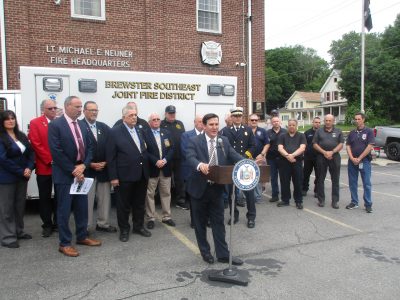Byrne Calls for Reimbursements to Fire Departments For EMS Runs

Assemblyman Kevin Byrne (R-Mahopac) is sounding the alarm to get a proposed bill passed in Albany that would allow volunteer fire departments that operate ambulance services to recover costs from insurance companies.
Last Friday, Byrne stood with emergency responders throughout the Hudson Valley outside the Brewster Fire Department, pressing his Assembly colleagues to pass a measure that would treat fire department ambulance services the same. Currently volunteer ambulance corps are allowed to bill for the costs of transporting a patient but not if the service is part of a volunteer fire department.
New York’s current policy, which affects about 490 departments statewide, is the only one like it in the United States, he said.
“I just want again to say that for all these men and women behind me that have been doing their job selflessly because they care about our community, they don’t ask who you are, they don’t care where you came from when you call 911, they’re there to help,” said Byrne, a co-sponsor of the Assembly bill that was introduced by Assemblyman Billy Jones (D-Plattsburgh). “They need resources and support. This bill will do that but it needs to pass.”
Byrne said the legislation has wide-ranging bipartisan support after similar measures have stalled in Albany for years. For the second straight year, the Senate approved it, but until recently it had been stuck in committee in the Assembly. However, on May 25, it was unanimously released from the Committee on Local Governance. It now must be released from Ways and Means to have a chance to be voted on before the session ends Thursday evening.
The assemblyman hoped to exert public pressure to bring the bill to the floor for a vote this week.
The financial ramifications of the current regulation are significant not only for volunteer fire departments but for property taxpayers, according to fire officials. Michael Karashay, the legislative chairman of the Fireman Association of the State of New York (FASNY), said about there is about $100 million in lost revenue annually.
“Our fire departments are not looking to make a profit on this,” Karashay said. “They want to be able to be on a level playing field.”
Somers Fire Commissioner John Fitzpatrick said the departments have no choice but to pass those unreimbursed costs onto property owners. Somers is one of four fire departments within Byrne’s 94th Assembly District that has ambulance service, along with Brewster, Mahopac and Mahopac Falls.
He said Yorktown has a volunteer ambulance corps, which is nearby their service and operates independently, but they can bill for service.
“The hardship is really on the taxpayers because we’ve had to raise our tax levy the last several years because the volume of EMS calls continues to go up and up and up,” Fitzpatrick said. “We’re just buying our fourth ambulance to help us answer all those calls.”
In Putnam County there were 7,779 EMS calls in 2020, said Ken Clair, the county’s deputy commissioner of the Bureau of Emergency Services. The Putnam fire departments within the 94th Assembly District that have ambulance services, Brewster, Mahopac and Mahopac Falls, accounted for nearly 3,200 of those calls, he said. Those statistics don’t include the Kent Fire Department, which also has EMS.
Byrne said the inability for fire departments to bill for their ambulance runs is forcing some departments to split the service, something that Lake Mohegan in Westchester did years ago. However, when that occurs other efficiencies are lost, he said.
However, some opponents of the bill have argued that volunteer responders might be competing with professional departments for funds, Byrne said.
“The existing policy is counterintuitive to the whole idea of sharing services,” Byrne said. “When you have someone doing it already, you’re incentivizing duplicate layers of government, which will probably cost more. This makes no sense.”

Martin has more than 30 years experience covering local news in Westchester and Putnam counties, including a frequent focus on zoning and planning issues. He has been editor-in-chief of The Examiner since its inception in 2007. Read more from Martin’s editor-author bio here. Read Martin’s archived work here: https://www.theexaminernews.com/author/martin-wilbur2007/
